We speak about a conversation when we want to engage in a deeper exchange with another person. This article outlines some thoughts on how to prepare for the conversation and how to make it as rich and constructive as possible. It speaks about the importance of emotions and body language, about stumbling stones we may encounter and how to manage them during the conversation. This article also addresses the questions of the dynamics of a conversation.
What is a conversation?
I hear more in more about conversations. People say that they want to have a talent conversation or a development conversation, etc. What do we actually mean when we use that terminology? We probably want to express that this is a deeper interaction compared to a normal exchange.
Let’s look into this a bit more in detail to understand what is specific about a conversation and how we can make it as successful as possible.
A conversation starts before it starts
The first point I would like to make is that a conversation starts before the conversation starts. Before we actually meat the other person, we have that event already in mind. We reflect ahead of the meeting about what the spirit of that exchange will be. We think about what the other person might have in mind. Sometimes we even anticipate the dialogue. We play that conversation through. That is a very good preparation for the conversation.
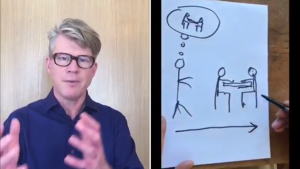
I would therefore recommend paying attention to that. Don’t let this reflection go by without memorizing them or without being at least aware of the kind of thoughts and ideas that we had before you actually met the person.
Connecting with our interlocutor
And then comes the moment when we get together and interact. It is important to be aware of the fact that we are in a bubble. Many philosophers have reflected about this situation of being in our own reality. They have written about the challenge it is to actually connect with our interlocutor who is in her/his own reality.
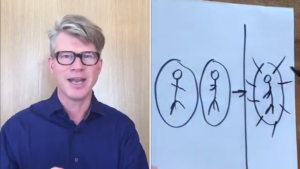
We are both in a bubble. The question is how can we burst the bubble? How can we create a connection?
The intellectual level, the emotional level and body language
In a conversation we want to establish a high quality connection. That happens not only at the intellectual level, but it happens also at the emotional level and it happens through the body language.
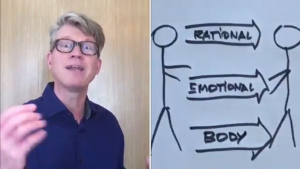
Think about the impact that a smile can have. Look at this picture of my little nice. Look at her beautiful smile. Isn’t that contagious? That is such a strong element of body language. We should have a holistic way of engaging. We should be attentive of the way we come across. Not only of the words we use, but also of the empathy that we have for the other person and of our body language.

Michel de Montaingne, who is a French philosopher, said that we can have a conversation also with animals. That shows that the conversation doesn’t only happen at the intellectual level. It happens also through the body language and through the emotions.
Stumbling stones
It is also important to be conscious of the fact that we will encounter barriers. There will be stumbling stones in our way. Multiple ones: Words may have a different meaning for the two parties. Intercultural differences may exist where a situation has different implications for one person and for the other person. We might also simply disagree on the interpretation of a possible situation. There might be a conflict about the way forward.
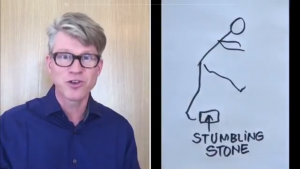
All of these barriers actually should be picked up. They should be part of the conversation. A conversation allows for time to observe what is going on in the relation. To bring these different perspectives, challenges to gain a common understanding and possible conflicts to the attention of our interlocutor. That should be part of the conversation. This possibility to observe our interaction itself is what makes the power of a conversation. That makes a conversation richer and deeper than a day to day interaction about fact and figures.
The dynamics of a conversation
Last but not least it is important to be mindful of the fact that a conversation has a certain dynamic.
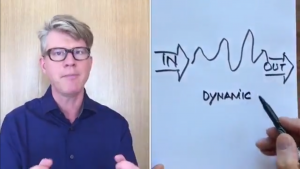
There is a way into the conversation. This is when we greet, when we acknowledge the other person and when we inquire about their well-being.
During the conversation when we might have had a more intense interaction. Emotions may come up.
At the end of the conversation we need to come back to a more neutral level of interaction so that we can exit together that conversation together.
I hope that these thoughts will help you to have even better conversations!
More information in my book:
Sven Sommerlatte : Successful Career Strategy – An HR Practitioner’s Guide to Reach Your Dream Job (Springer, June 2023). ISBN: 978-3-662-66790-3
